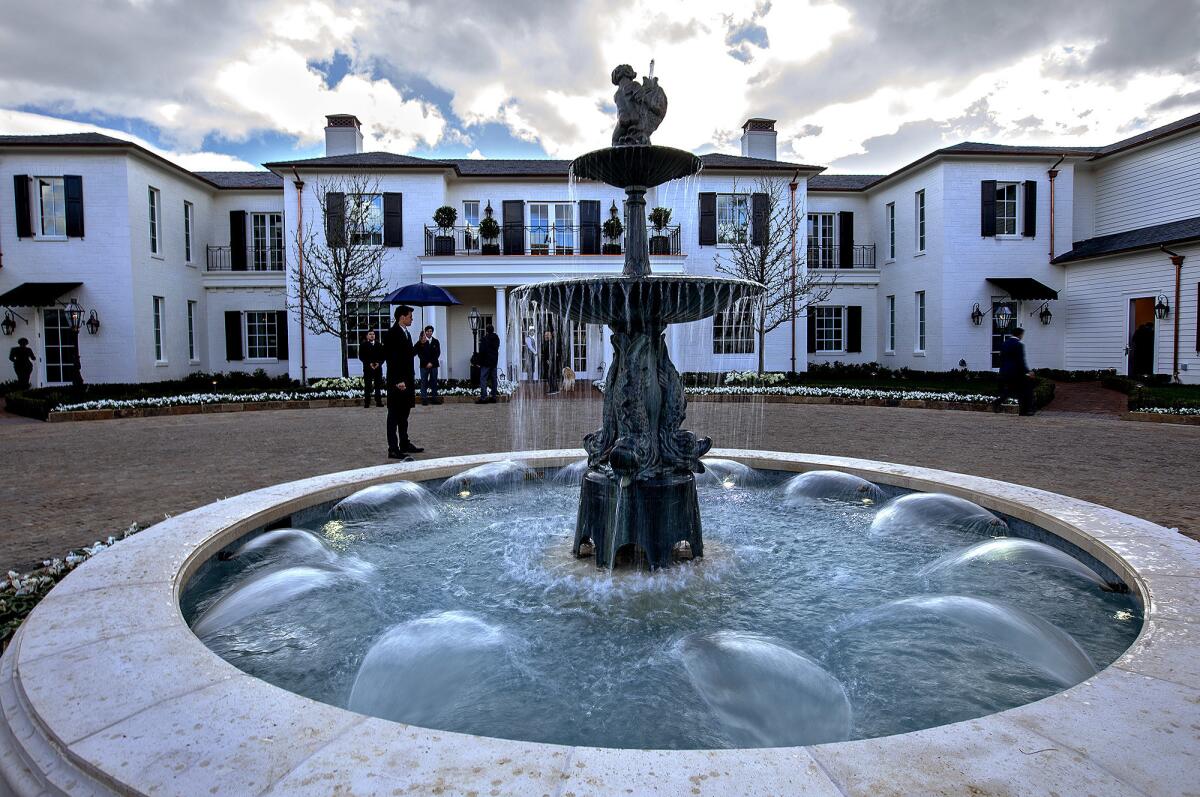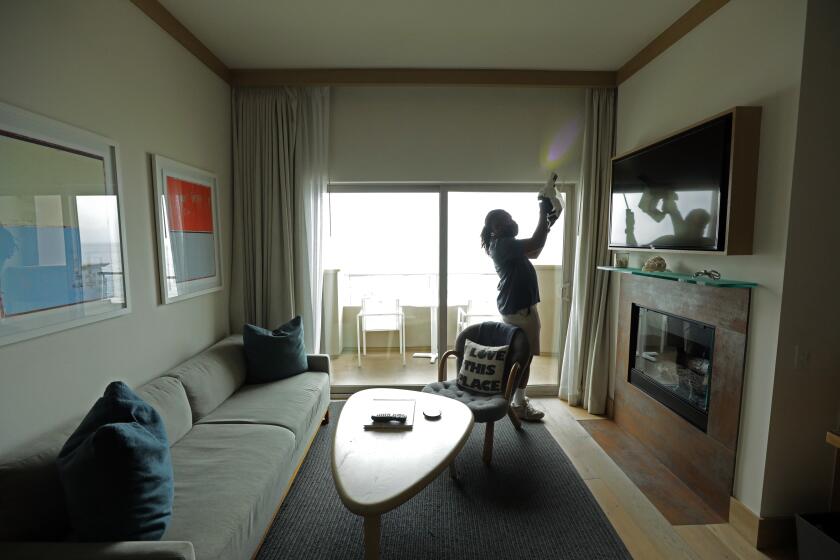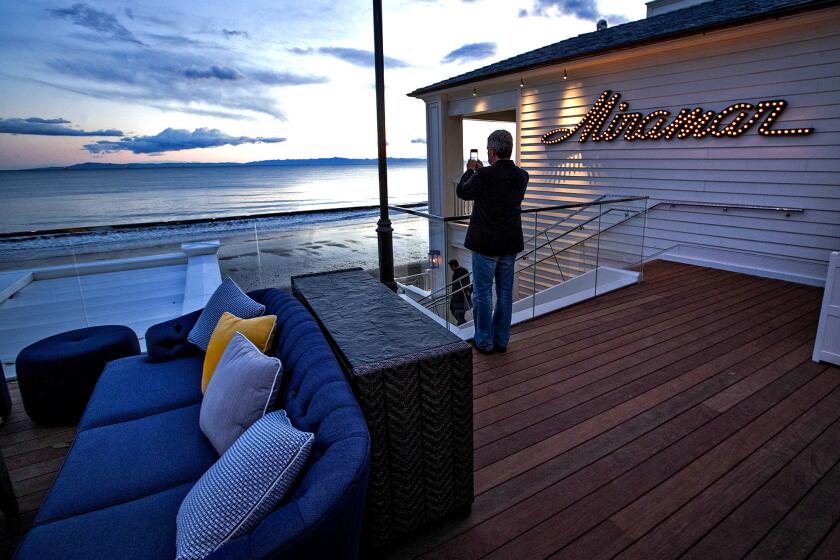Luxury hotels become home for some rich folks looking for a COVID haven

After a very quiet spring, Julie Danziger, managing partner of travel advisory Embark Beyond, spent the greater part of June and July booking compelling domestic alternatives for her clients, who normally favor Italian villas and Greek resorts at the end of summer.
But something strange happened in August: No one was ready to go home.
“Suddenly, all of my clients were asking where they could spend the rest of the year,” Danizger said, citing specific queries from her monied New York customers about Cabo San Lucas, Mexico; Cape Cod, Mass.; and St. Barthélemy in the Caribbean.
All were looking for a second — or third or fourth — pseudo home at a hotel. Demand is increasing at luxury resort properties and urban hotels, which have suffered from a reduction in visitors.
Living in hotels is by no means a new idea; a handful of storied properties in New York and Los Angeles have hosted actors, artists and other bon vivants for long-term stays over the decades. The idea had a resurgence at the pandemic’s start, when stranded vacationers tried to ride out quarantines wherever they’d taken spring breaks.
But with work-(and school)-from-home mandates stretching into the foreseeable future, many Americans are finding themselves untethered to their primary residences. And some with deep pockets are interested in multi-month hotel bookings that could stylishly bypass a cold-weather span of locked-down living.
Amid pandemic, hotels and sports arenas get cleanliness seal from chemical companies
Both the Beverly Hills Hotel and the Hotel Bel-Air have seen an uptick in 90-day bookings since the advent of COVID-19 — mostly from L.A. natives.
“These guests do not feel safe in [their own] homes with staff members coming in and out, without proper protocols in place,” said Ed Mady, the regional director of the Dorchester Collection, which manages both properties. By contrast, Mady’s hotels each have an on-site nurse, as well as a dedicated director of risk management to ensure full compliance with Centers for Disease Control and Prevention guidelines.
A quarter of the guests at Timbers Kaua’i in Hawaii are currently booked in for stays longer than 30 days; Gurney’s Montauk, normally a weekender haven in New York’s Long Island, also reports multiple visitors bedding down for an entire month. After a surge of interest, Ocean House in Rhode Island anticipates at least three long-stay families for the fall.
Demand has been so strong that some hospitality companies are formalizing brand-wide offerings.
Take Auberge Resorts. The Mill Valley, Calif., company owns 19 hotels around the world, including three properties in Napa Valley as well as the newly renovated Mayflower Inn & Spa in Connecticut and the adventure-centric Madeline Hotel in Telluride, Colo.
A two-month booking at those hotels can come with a 30% to 40% discount on the nightly rate, along with private tutoring services for kids. Some “Remote With Auberge” package deals include personally stocked in-room kitchenettes, pet care and laundry. The chain has experienced a 300% increase in the length of guests’ stays.
In promotional literature, Auberge Resorts Collection Chief Executive Craig Reid tells potential visitors with means: “Whether it’s for a week or for a month, this is a great opportunity to get out of your day-to-day environment, boost productivity and leave your everyday cares to us, all while enjoying unrivaled space and knowing your kids are getting an edge with best-in-class tutors in naturally rich learning environments.”
Sheltering at a luxury hotel comes with a hefty price tag. Even with a 30% discount, a recently booked year-long stay at Rosewood Miramar Beach’s two-bedroom residence in Montecito, Calif., would cost roughly $1.1 million.
In a quiet garden at the Rosewood Miramar Beach resort in Montecito is a white marble statue of the Buddha, laughing while four small children clamber up his side.
International tourism is still highly limited for Americans, but all is not lost for those who want to live the expatriate life on an island.
As part of Barbados’s tourism rebuilding plan, the Caribbean island nation announced a 12-month Welcome Stamp initiative in late June; for a $2,000 fee, visa holders can work remotely, tax-free, for a full calendar year.
To help stamp holders settle in, the Hilton Barbados Resort is offering room rates that start at $2,500 a month, with the opportunity to grab office space with a beach view and use the hotel’s dedicated shipping services to bring personal effects.
Similarly, Bermuda’s newly announced Work From Bermuda certificate encourages digital nomads to move right in for $263. Sascha Hemmann, managing director at the island’s Rosewood Bermuda, said he’s “prepared to negotiate a competitive rate” for extended stays.
The first deal he signed included six weeks in an Ocean View King room with deeply discounted spa and laundry services and a private golf cart to get around the island. (The price isn’t being undisclosed.)
To deal with the onslaught of requests, Danziger of Embark Beyond put together a spreadsheet of everything a long-stay guest might need: laundry service, a parking space, easy breakfast options.
Then she started asking resorts for preferential pricing. It didn’t take much convincing. Even hotels and resorts that ordinarily never move the discount dial were keen to start recouping losses by booking long visits; what Danzinger proposed would not only fill their rooms for multiple months but breathe life into their food and beverage offerings.
“I’ve been getting quotes for 30%, 40%, and even 50% off the best available rates for one- to three-month stays at coveted places like Amanyara, the Four Seasons Anguilla and Montage Laguna Beach,” Danziger said.
Danziger is seeing extended staycation requests in New York, too, including a three-month stint at the Mark and a two-month sojourn at the Carlyle by native New Yorkers.
As a result, she’s created Embark Longer, a spinoff brand for her agency to streamline the plethora of long-stay queries that continue to pour in. (Danziger’s company describes itself online this way: “More than a travel agency, Embark Beyond is a luxury travel advisory dedicated to creating thoughtfully designed experiences that go beyond a destination.”)
“Hotels are being really transparent with their rigid safety procedures, because they can’t afford to mess up,” Danziger said, as the trust factor offered by a luxury property fast becomes as much of a draw as the destinations.
“People now want the protection, comfort, and convenience of a hotel, instead of a standalone home,” she said. “And after the stress of the last six months, who isn’t ready to move in and be pampered by a hotel?”
More to Read
Inside the business of entertainment
The Wide Shot brings you news, analysis and insights on everything from streaming wars to production — and what it all means for the future.
You may occasionally receive promotional content from the Los Angeles Times.












